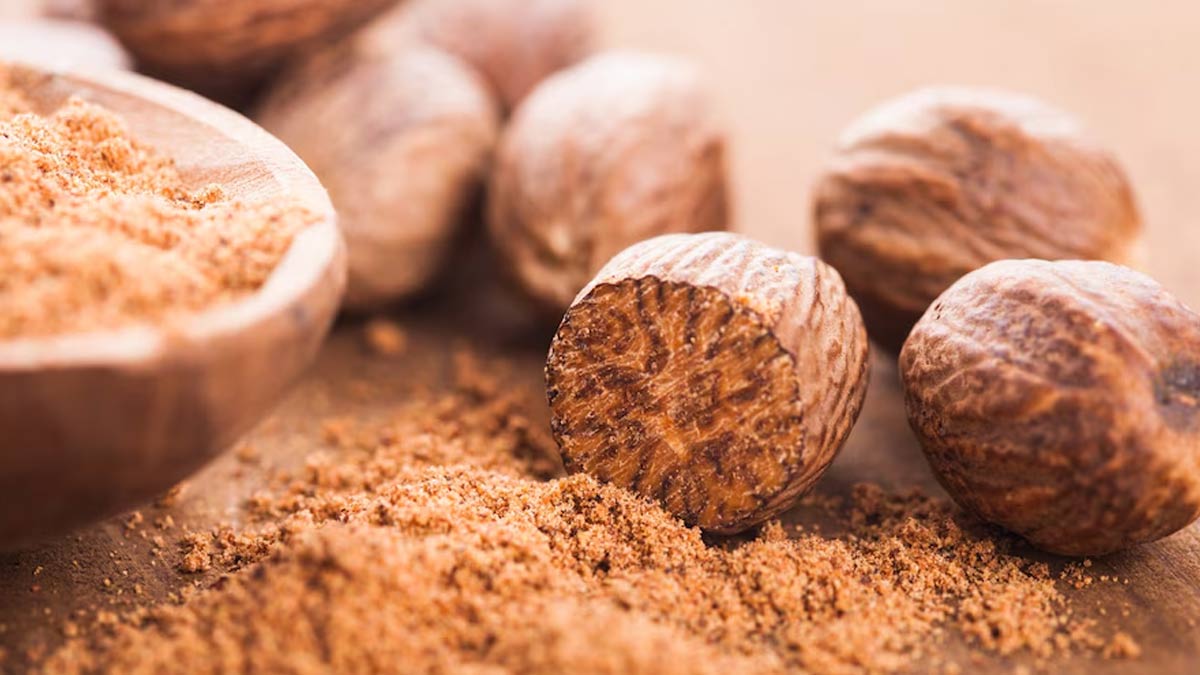
Did you know nutmeg is more than just a spice that adds a warm, comforting flavour to your favourite dishes? This spice is derived from the seeds of the Myristica fragrans tree and is a good option to manage your blood pressure levels. It is loaded with calcium, potassium, and magnesium, which are crucial for managing high blood pressure. In this article, we explain how nutmeg can help manage your blood pressure and how to use it effectively.
Table of Content:-
What Is High Blood Pressure?

According to Johns Hopkins Medicine, optimal blood pressure is 120/80 mm Hg or below. In adults, high blood pressure is defined when systolic pressure is above 140 or diastolic pressure is over 90. Usually, a high blood pressure diagnosis is made after having elevated readings on three different occasions within one week.
High blood pressure happens when the force of blood against artery walls remains consistently elevated, potentially leading to serious health complications like heart disease, stroke, and kidney issues.
Benefits of Nutmeg for High Blood Pressure
Anti-Inflammatory Properties

Nutmeg contains anti-inflammatory compounds like myristicin and elemicin. Chronic inflammation can lead to high blood pressure by damaging blood vessels and causing arterial stiffness. Nutmeg can help reduce inflammation, maintain blood vessel flexibility, promote healthy blood flow, and lower blood pressure.
According to a 2021 study, nutmeg is packed with calcium and magnesium, essential micronutrients that help regulate blood pressure.
Antioxidant Effects
Nutmeg contains potent antioxidants, including phenolic compounds, which help protect the body from oxidative stress. Oxidative stress can harm blood vessels and raise blood pressure. The antioxidants in nutmeg protect the cardiovascular system from damage by neutralising free radicals.
Also Read: Managing High Blood Pressure And Blood Sugar: Expert Lists Supplements You Should Avoid
Relaxation and Stress Reduction

Nutmeg has natural sedative properties that can help promote relaxation and reduce stress. Chronic stress is a known risk factor for high blood pressure. The compounds in nutmeg can help calm the nervous system, reduce anxiety, and improve sleep quality, all of which contribute to lower blood pressure levels.
Improved Circulation
Nutmeg can boost blood circulation by enhancing blood flow and expanding blood vessels. Improved circulation ensures that the heart doesn't have to work as hard to pump blood throughout the body, which can help lower blood pressure.
Ways To Use Nutmeg for Managing High Blood Pressure
Here are some practical ways to use nutmeg for managing high blood pressure:
Nutmeg Tea

Nutmeg tea is a soothing beverage that can be enjoyed at any time of the day. To make nutmeg tea:
- Boil a cup of water.
- Add a pinch of freshly grated nutmeg or a small piece of nutmeg.
- Let it steep for 5-10 minutes.
- Strain and add honey or a slice of lemon for extra flavour.
Also Read: Anxiety And High Blood Pressure: Expert Explains Their Connection And Management Measures
Spice Blends
It can be added to various spice blends that are used in cooking. Combine nutmeg with cinnamon, cloves, and ginger to create a warming spice mix that can be used in baking, oatmeal, or sprinkled over fruits and vegetables.
Smoothies
Adding a pinch of nutmeg to your morning smoothie can enhance its flavour and provide health benefits. You can pair it well with fruits like bananas, apples, and berries.
Savoury Dishes
Nutmeg is not just for sweet dishes; it can also enhance savoury recipes. Add a small amount of nutmeg to soups, stews, and sauces for a warm, aromatic touch. It pairs especially well with creamy dishes like mashed potatoes or macaroni and cheese.
Precautions
While nutmeg can offer health benefits, it’s essential to use it in moderation. Consuming large amounts of nutmeg can lead to adverse effects, such as nausea, dizziness, and hallucinations due to the compound myristicin. Stick to small quantities, such as a pinch or a small piece, to avoid any negative side effects.
[Disclaimer: This article contains information for informational purposes only, hence, we advise you to consult your own professional if you are dealing with any health issues to avoid complications.]
Also watch this video
How we keep this article up to date:
We work with experts and keep a close eye on the latest in health and wellness. Whenever there is a new research or helpful information, we update our articles with accurate and useful advice.
Current Version